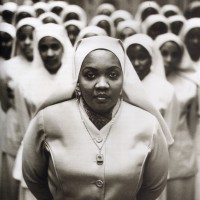
Re-membering the Name of God
NewsThis week on the Chronic, we call God by all his names,creep up to the thresholds of Heaven, peak over the silver lining and approach God.
In the Upper Room, Florence Madenga cyber-connects to her spirituality.
“We are waiting for Apostle Debbie Banda-Viggs, a Malawian evangelist living in McKinney, Texas. None of us have ever seen her in person, but she will come to us through the small speakers my father has plugged into his laptop. The five of us – me, my 12-year-old brother and 22-year old sister, and my middle-aged parents – gather around the laptop in our small, three-bedroom apartment in Alexandria, Virginia. No one speaks. Someone turns off the washing machine droning on in the laundry room in the hallway.
We have been invited to the Upper Room. The e-mail, forwarded to me through Debbie Banda Ministries International, says that we are part of an exclusive group of worshippers. We have now entered a season of warfare, and it is time to crush the enemy, before we embark on what sounds like a brutal 70 days of fasting.
We edge closer to the laptop as a woman’s voice asks us to type if we can hear her. My mother nods. My father eagerly types yes.
“Come on, begin to pray,” says the voice, revving up like an engine. Other, lower voices from the speaker begin to murmur and pray. “Begin to ask God for forgiveness of sin,” commands the voice. We begin to murmur and pray. We have entered the Upper Room. We are ready for the high.”
- Read The Upper Room
In Re-membering the Name of God, Wendell Hassan Marsh maps the trajectories of Islam as it evolved in the New World and the limited definitions of Muslim communities in the African-American consciousness.
“My father was not a simple man even if his job was. After a high school education, for a living, he stirred paint that would be used on aeroplanes. Reading a full book, to him, seemed as unlikely as the Second Coming. That changed after he learned the name of God. He had been working at an aircraft manufacturer in Atlanta during the late 1960s when one of his co-workers asked him if he recognised the words on the side of a nearby jet. My father craned his neck briefly before laughing at this crazy Negro for asking him to read what seemed like squiggly lines. “You laugh at me, when you are the one who has forgotten your own language,” I always seem to imagine the other man saying. He then read the lines.
لا اله الا الله
la ilaha illAllah
There is no god, but God, the man told my father.”
The struggle for freedom is a reckless, foolish and sacrosanct adventure – so believed Albert Luthuli, the first president of the African National Congress. A devout Christian, a man deeply committed to land and community, Luthuli saw the relationship between a nation and its ideals as founded on shared values, not the ingratiated construct that beleaguers the nationalism playing out in South Africa today. Jon Soske delves into the unpublished notebooks and speeches of a revered leader, who thought, fought and sometimes raged for justice.
For more, head to The Chronic
